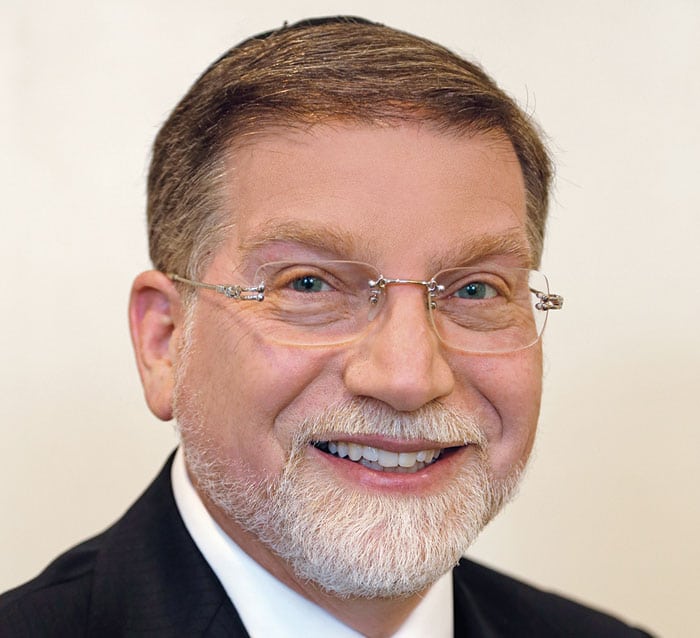 Rabbi Elazar Muskin
Rabbi Elazar Muskin In the summer of 1985, Rabbi Elazar Muskin and his wife Ruhama came to Los Angeles on their honeymoon. They stayed with family who lived in the Fairfax-La Brea neighborhood for Shabbat and were planning to go up to Northern California the following week.
“I had a classmate in the San Francisco area,” said Muskin. “We were going to spend the second Shabbos with him. But we never got there.”
Instead, during that first weekend in town, Muskin met a man who told him that a synagogue in Pico-Robertson was looking for a rabbi.
“It was unbeknownst to be, but that Sunday night, they were going to meet me,” Muskin said. “They asked if I would stay in Pico the following Shabbos for an interview.”
At the time, the only Orthodox synagogue in Pico-Robertson was Beth Jacob Congregation, but some members had broken off to form Young Israel of Century City. It was small – there were only 50 families at the time – but Muskin recognized it had potential.
“I had a dream of building a shul. It’s what I always wanted to do.”
“I saw a vision that this whole community was going to boom,” he said. “I had a dream of building a shul. It’s what I always wanted to do. I never wanted to succeed a rabbi in a major shul. It didn’t intrigue me. I wanted to start a shul from scratch. There was no membership list. There was no infrastructure. That excited me. I could build it.”
In January of 1986, Muskin officially became the rabbi of YICC, and led the congregation as it expanded to 500 families. It became one of the fastest growing synagogues on the West Coast. At the same time, Pico-Robertson became one of the most Jewish neighborhoods in LA.
“I used to know every Orthodox Jew in Pico-Robertson,” said Muskin. “But now I don’t anymore. Thank God, it’s expanded.”
Becoming a rabbi was in Muskin’s blood; he is a third-generation Orthodox rabbi. His grandfather was a rabbi in Chicago, and his father served in Cleveland, where Muskin grew up.
“It was a dynamic community, and a very strong community,” he said. “I came from a very religious Zionistic home. The Jewish Federation of Cleveland was well known internationally as one of the strongest and most dynamic and active Jewish Federations in the country.”
Though Muskin’s family was in the rabbinate, he didn’t necessarily plan on going into that line of work. Instead, it just seemed to fit his personality.
“Already, in fifth grade, my friends would tease me and say, ‘Oh, you’re a little rabbi,’” he said. “My mother told me, ‘I think they may have pegged you correctly.’ She said it’s a very difficult life, but if you can do it, then do it the best.”
Prior to entering the rabbinate, Muskin was the executive director of T’chiya Volunteers, an organization that served development towns in Israel. He then studied at Yeshivat Kerem B’Yavneh in Israel and got his ordination from Yeshiva University’s Rabbi Isaac Elchanan Theological Seminary. He was the first Los Angeles rabbi to become president of the Rabbinical Council of America, and he was past president of the Rabbinical Council of California as well.
Though Muskin is a highly accomplished leader, he takes more pride in the fact that many YICC members end up becoming leaders within the Jewish world, too.
“They’ve become very involved leaders, including chairmen on boards and as presidents [at Jewish organizations],” he said. “The job of a leader is to create more leaders. Rabbi Lord Jonathan Sacks said that. I took that to heart.”
At the end of the day, what matters most to Muskin is the people he serves.
“I’ve always been interested in the Jewish community,” he said. “Growing up, it was always a topic of discussion around the Shabbos table. That was our bread and butter. We talked about whatever the community was confronting, in particular in Israel. It was front and center in the discussion.”
It’s only fitting, then, that the Jewish teaching that Muskin closely follows is from Perkei Avot.
“Hillel says, ‘Do not separate yourself from the community,’” said Muskin. “You have to be part of the community.”
Fast Takes with Elazar Muskin
Jewish Journal: What’s your favorite Jewish food?
Elazar Muskin: Everything my wife makes. She is a phenomenal cook.
JJ: What would you be if you weren’t a rabbi?
EM: Probably a professor of either history or literature.
JJ: What are you reading right now?
EM: Elie Wiesel’s “All Rivers Run to the Sea.” It’s his memoir, and it’s incredible.
JJ: What’s your favorite spot to travel to?






















 More news and opinions than at a Shabbat dinner, right in your inbox.
More news and opinions than at a Shabbat dinner, right in your inbox.